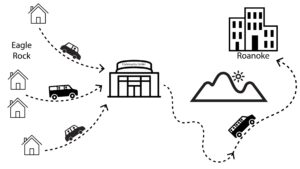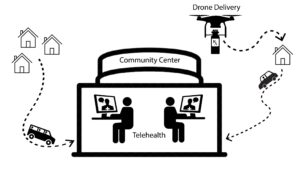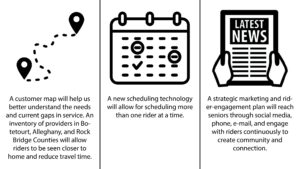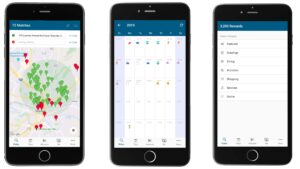In 2020, Botetourt County was selected as one of four communities by the National Center for Mobility Management (NCMM), for the Community Mobility Design Challenge to develop and test ways to address the particular mobility challenges experienced by low-income community members for whom a lack of transportation is an obstacle to the pursuit of economic, health, and social well-being. NCMM is a technical assistance center operated by the Community Transportation Association of America (CTAA) and funded through the Federal Transit Administration (FTA).
The Botetourt County team, led by the Roanoke Valley-Alleghany Regional Commission, focused on transportation access to healthcare for elderly and/or disabled people in rural Botetourt County. Before applying for the grant, the team researched the extent of the identified transportation challenge through interviews and other types of primary and secondary research. NCMM staff led the team in developing insights from a “deep dive” into the specific transportation needs of rural Botetourt County seniors and people with disabilities. The team has developed four options and is testing key assumptions about these concepts with potential users and other stakeholders. The team will modify the solutions to ensure they closely respond to the identified challenge and plan how to operationalize the solution, paying close attention to the financial viability and sustainability of the solution.
The project has brought together partners from the Eagle Rock Ruritan Club, Botetourt County, the Botetourt Resource Center, transportation, and other community agencies. The team will also create performance measures to show the projected impact of the project, among other key indicators.
Through research, conversations with stakeholders, and workshops, the team generated four options. The team identified assumptions underlying the four options and is in the process of testing these assumptions. For example, a ride-match app assumes that Botetourt seniors who need rides have access to the internet and are able to use the technology. Since that is probably not true for many residents, the team must consider strategies to overcome these limitations.
Option #1: Weekly Transport – Eagle Rock to Roanoke
A weekly shuttle for rural seniors and people with disabilities will pick up riders from their home or a central pick-up point and transport them to their appointments in the Roanoke Valley.
Option #2: Replacing Trips with Tech
Replace van trips with prescription delivery by drone and telehealth hubs at
community centers.
community centers.
Option #3: Creating Community Connections
A customer map will help us better understand the needs and current gaps in service. An inventory of providers in Botetourt, Alleghany, and Rock Bridge Counties will allow riders to be seen closer to home and reduce travel time. A new scheduling technology will allow for scheduling more than one rider at a time. A strategic marketing and rider-engagement plan will reach seniors through social media, phone, e-mail, and engage with riders continuously to create community and connection.
Option #4: Connect to Healthcare
A web-based volunteer driver management app will match riders with volunteer drivers. Community organizations will assist riders and drivers with using the app, providing internet access and technical assistance. Volunteer drivers will receive incentives or subsidies to offset their costs.
For more information, please contact Rachel Ruhlen at [email protected].




